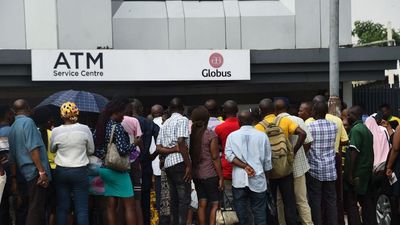Nigerian Naira Shortage Triggers Chaos and Confusion
In Nigeria, the shortage of newly-mandated naira notes has triggered resentment amongst citizens.
In the midst of the Nigerian political climate, the shortage of newly-mandated Nigerian naira notes has triggered resentment amongst Nigerian citizens.
Following the redesign of the Nigerian naira by the Nigerian federal government in November, many financial institutions are scrambling to satisfy consumer demand for the new notes, leading to a cash shortage. Nigerians are also increasingly growing anxious because there isn’t enough supply to satisfy the demand. Because Nigeria is an economy that is still widely cash-centered, it has been challenging for a multitude of people to use their debit cards for daily transactions; over 40% of the population don't have bank accounts.
Nigeria's President Muhammadu Buhari and cabinet ordered the general public to stop using the old currency on February 10, 2023. Following the ongoing outrage from Nigerian citizens, President Buhari extended the deadline by 60 days for some older currency notes to remain legal tender. However, the deadline was not extended for the old N500 and N1,000 notes. Nigeria’s Central Bank introduced a new currency at the end of 2022, but gave citizens insufficient time to turn in the old bills for new ones, and the outcome has resulted in chaos. According to the Nigerian government, the introduction of the new currency would strengthen the economy, and put an end to illicit and fraudulent financial activity.
In a statement obtained by Voice of America, during a statement addressing Nigerian citizens, President Buhari expressed sympathy over the cash shortage.
"I'm addressing you to identify with you and express my sympathy over the difficulties being experienced as we continue the implementation of new monetary policies," he said. "I'm not unaware of the obstacles placed on the path of innocent Nigerians by unscrupulous officials in the banking industry. I sincerely sympathize with you all over these unintended outcomes.”
The naira shortage has also significantly affected commercial activity, causing sales vendors, who normally accept physical cash as legal tender, to scramble for ways to receive payments for their goods and services.
Although there has been a 60-day extension, the lines at banks across the country continue to get longer, with many consumers spending days and nights at the queues, and banking officials themselves growing increasingly overwhelmed.
Across the nation, several people have vocalized their grievances by vandalizing cash dispenser machines at banking institutions, and according to local media reports, there have been mass protests. The timing for the cash shortage clashes with Nigeria’s February 25 elections, which is only a few days away.
- Why are Nigeria’s Super Falcons Earning Significantly Less Than Their Male Counterparts? ›
- How Lagos’ Inclusive Rave Scene Is Popularizing EDM In Nigeria ›
- How to Prosper as a Nigerian Writer ›
- How Nigeria's Struggling Economy is Impacting its Fashion Industry - Okayplayer ›
- Inflation is Leaving Nigerians Feeling Uncertain About The Future - Okayplayer ›
- Why Kenyans Are Opposing a New Finance Bill by Their Government - Okayplayer ›
- What It’s Like To… Be a Currency Exchange Trader in Nigeria - Okayplayer ›
